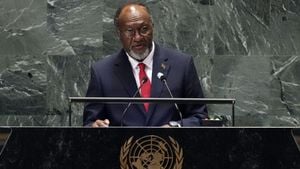France is teetering on the brink of political chaos as Prime Minister Michel Barnier faces two no-confidence motions scheduled for Wednesday. These motions come from opposition parties, including the far-right National Rally and the left-wing New Popular Front, both united by their discontent with Barnier's controversial handling of the country's budget amid mounting financial pressures.
Barnier, who was appointed by President Emmanuel Macron after July's snap elections resulted in a hung parliament, has struggled to maintain stability with his minority government. The recent political turbulence intensified after Barnier invoked Article 49.3 of the French constitution to push the government’s social security budget through Parliament without a vote, angering both left and far-right lawmakers.
Mathilde Panot of the left-wing France Unbowed (LFI) group described this move as “one blow too many from an illegitimate government.” She concluded, “Barnier’s fall is a done deal. Macron will be next.” This sentiment reflects the growing frustration among legislators who feel excluded from the decision-making process.
At the heart of the no-confidence motions is the 2025 budget proposal, which includes significant tax increases totaling $62.8 billion and spending cuts of approximately 40 billion euros ($42 billion). Barnier’s efforts aim to reduce France’s public deficit, which currently hovers around 6.1% of GDP, well above the European Union's limit of 3%.
Political pundits argue this budget approach is politically hazardous for Barnier, as it targets welfare allocations at a time when many citizens are feeling the pinch of economic challenges. “The French will not forgive us for putting the interests of individuals before the future of the country,” Barnier asserted, trying to justify the tough budgetary measures.
Marine Le Pen, the leader of the National Rally, who has long criticized the government as “dangerous and unjust,” stated, “Backing the no-confidence vote is the only constitutional way to protect French people from this punitive budget.” Her party dominates Parliament and poses the most significant threat to Barnier's government.
Jacob Ross, a political analyst with the German Council on Foreign Relations, noted, “Barnier is increasingly reliant on support from parties he cannot fundamentally trust, especially those on the radical right.” This precarious alliance raises questions about the durability of Barnier's leadership.
If the no-confidence votes succeed, Barnier’s government will be ousted, marking the first government downfall from such motions since 1962. The resulting political vacuum may exacerbate France's existing issues, leading to potential instability not just within its borders but across Europe.
Barnier’s cabinet has been mired in various crises this year, including the fallout from controversial pension reforms earlier this year, which sparked widespread protests. Observers predict, should the no-confidence motions pass, France's political environment will shift toward even more significant uncertainty.
President Macron, currently on diplomatic business abroad, faces immediate repercussions. If Barnier’s government collapses, he might need to appoint a new prime minister capable of garnering support from the fractured Parliament. “We are going back to playing the same game again,” warned Gesine Weber, of the German Marshall Fund, highlighting the significant political deadlock facing Macron.
French citizens themselves are divided on the situation. Some feel disillusioned with the political system and desire more compromise, particularly related to budgetary matters, which impact the everyday lives of many. Barbara Darbois, living in Avignon, expressed her frustration, stating, "We aren’t used to compromise like other European countries.” Meanwhile, others believe the government’s austerity measures may be necessary, viewing the budget as potentially catastrophic if left unchecked.
Compounding the urgency of the situation, France’s political crisis parallels instability experienced by other major European nations such as Germany. The timing is especially precarious, with the anticipated return of Donald Trump to the White House looming as uncertainty around European leadership continues.
The no-confidence motion is more than just about Barnier's leadership. It embodies the sentiments of discontent across the political spectrum, representing the tension within French society as citizens grapple with the burdens of economic austerity. Should Barnier fall, Europe must brace for the challenges of another significant political shift.
Politicians and pundits alike are keeping their eyes on both the upcoming vote and the broader ramifications for France. The stakes couldn’t be higher. Will Barnier's government prevail or fall? Political history suggests the latter may be upon us. But no matter the outcome, the French people will be left facing the consequences of their government’s decisions, long after the shouting stops.



